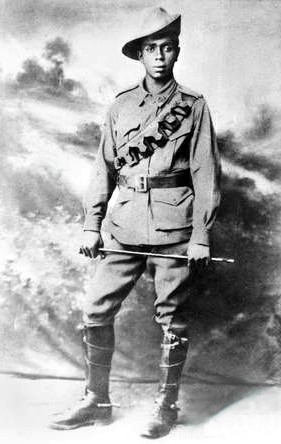
Australian War Memorial under the ID Number: P00889.012
Rebecca Wheatley and Laura James interviewed Wesley Enoch for this session of the course.
Wesley wrote the play “Black Diggers” after researching how the indigenous Australians were treated before, during and after war.
One way the aboriginal peoples of Australia told stories was through clap sticks – clapping them together, reading the stories told by the painting or etching on the sticks. By “reading” a clap stick you can tell a lot about the culture as well as who owned it.
At the outbreak of WW1, aboriginals in Australia, despite being the original landholders of the country, had no rights under white people government. They were not considered as citizens. So why would they volunteer to enlist and fight for that country who gave them no rights?
The Australian War Memorial have found, so far, about 1300 indigenous people who have served in WW1 in their records.
Why did they enlist?
Part of growing up on a mission station (often run by churches) was the idea of service to your community. Also there was a lot of oppression on a mission station so joining up gave freedom and adventure away from the station. Another reason that is contentious is the idea of warrior spirit – being able to go out and hunt or kill which they were not allowed to do on the stations. These skills showed you were a warrior within the tribe.
Prior to the end of 1916 when a referendum was held, the AIF would not allow indigenous soldiers to join as they were not of European heritage. But after the referendum, this changed. Once the soldier joined the AIF, he was treated the same as the substantially European soldier even though the indigenous man would be treated as different back in his home state.
What were they fighting for?
Treated as a mate and part of the team while in the trenches or desert yet once back home, each state could treat them differently. Earning money while fighting, yet when that money was sent home to family, the aboriginal protector would take the money rather than give it to family.
How were they treated when fighting?
Having one racist person in a platoon or unit was not acceptable as this would stop the unit working as a team especially if the racist would not obey commands from the black leader of the unit.
It is interesting looking back 100 years to see the diversity of stories both in the fighting and upon return to Australia. World War 1 was the time when Australia came together as a nation – we were fighting as a country – whether white or black. But now we can see the problems caused upon return like shell shock, beatings of women, break up of families – problems affecting both black and white soldiers. But how did the government help with these problems?
Back home – has it changed?
Whilst fighting, many indigenous soldiers learnt new skills that they wanted to use back home to improve their life on the missions and stations. White soldiers started wanting rights for their indigenous mates – able to go to the pub for a drink with each other.
On our $50 note there is a church on the back which is from an aboriginal station at Raukkan and in it is memorial stained glass windows for the indigenous soldiers who enlisted from that station. They fought for freedom and justice is inscribed on the windows.
There was a spiritual loss for the aboriginal families who lost sons or fathers or brothers – they were no longer in their country. Very few mothers would be able to visit the war graves as they were not citizens of Australia and couldn’t travel even if they could afford it. That is why medals, letters and diaries were very important for them to keep in touch with their loved ones.
With all the upsurge of celebrating the 100 years, there is now a group of people called connecting spirits who will visit these graves in Europe with groups of children and exchange soils from home land and the grave area where they are buried. A way to have a ceremony to connect with their spirits.
My reflection for this week:
This week I have been ashamed to be an Australian, but I know we can’t blame this generation for the sins of their forefathers. Life in Australia for the indigenous people was terrible 100 years ago and there are improvements happening but it is a slow process.
Being a retired teacher who has taught about the aboriginal feel for their country, their oral stories and the passing down of knowledge, I could see how the mothers felt when all they had was a medal or letters or diaries. How disappointed they would be that the mourning ceremonies could not be done properly over their son, father, brother.
So glad that descendants of the indigenous soldiers now have a chance to do the ceremonies and make that connection again.